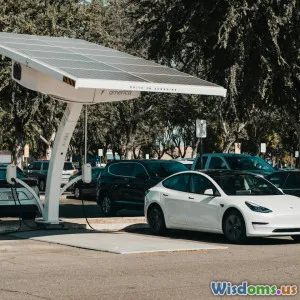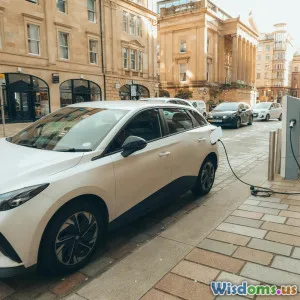
Understanding EV Charging
5 min read Explore the essentials of EV charging, including types, benefits, and how to choose the right charging solution for your electric vehicle. (0 Reviews)
Understanding EV Charging
Electric vehicles (EVs) are rapidly becoming a significant part of our transportation landscape, thanks to their reduced environmental impact and advancements in technology. However, one of the most critical aspects of owning an EV is understanding how charging works and the various options available. This article will explore the fundamentals of EV charging, including types, benefits, and practical considerations to ensure you make the most informed decisions.
1. The Basics of Electric Vehicle Charging
Charging an electric vehicle involves transferring electrical energy from a power source to the vehicle's battery. This process can occur at home, work, or public charging stations, and understanding the different types of charging is essential for EV owners.
2. Types of EV Charging
2.1 Level 1 Charging
Level 1 charging uses a standard 120-volt outlet, which is common in most homes. This method is the slowest, typically providing about 4-5 miles of range per hour of charging. Level 1 charging is suitable for overnight charging at home, especially for those with shorter daily commutes.
2.2 Level 2 Charging
Level 2 charging operates on a 240-volt circuit, providing a much faster charging solution, typically around 25 miles of range per hour. This type of charger is often installed at homes and commercial locations, making it ideal for daily use and longer trips.
2.3 DC Fast Charging
DC Fast Charging, or Level 3 charging, is designed for rapid charging, delivering an 80% charge in about 30 minutes. These chargers are typically found along highways and in urban areas, making them perfect for long-distance travel. However, they are more expensive to install and usually found in commercial settings.
3. Benefits of EV Charging
Understanding the advantages of EV charging goes beyond just convenience. Here are a few key benefits:
- Cost Savings: Charging an EV is generally cheaper than refueling a gasoline vehicle, especially when utilizing home solar energy.
- Environmental Impact: EVs produce zero tailpipe emissions, contributing to cleaner air and lower greenhouse gas emissions.
- Convenience: With charging stations becoming more widespread, EV owners can charge their vehicles at home, work, or while out running errands.
4. Choosing the Right Charging Solution
When selecting a charging solution, consider the following factors:
- Daily Driving Distance: If you have a short commute, Level 1 charging may suffice. For longer distances, consider investing in a Level 2 charger.
- Charging Location: Evaluate your access to charging stations at home, work, and along your typical routes. This can help you determine the best charging equipment for your needs.
- Cost: Review installation costs for home chargers and potential savings from using public stations.
5. Future Trends in EV Charging
As the EV market continues to grow, so does the technology surrounding charging solutions. Future trends may include:
- Wireless Charging: The development of inductive charging technologies could eliminate the need for physical charging cables.
- Smart Charging: Integration with smart home systems will allow users to optimize charging times based on energy costs and grid demand.
- Ultra-Fast Charging: Continued advancements in DC fast charging technology will make it even quicker to charge EVs on the go.
Conclusion
Understanding EV charging is essential for anyone considering or currently owning an electric vehicle. By familiarizing yourself with the different types of chargers, their benefits, and how to choose the right solution, you can enhance your EV experience and contribute to a more sustainable future. With ongoing advancements in technology and infrastructure, the world of EV charging is set to evolve, making it easier than ever to drive electric.
Rate the Post
User Reviews
Popular Posts


















